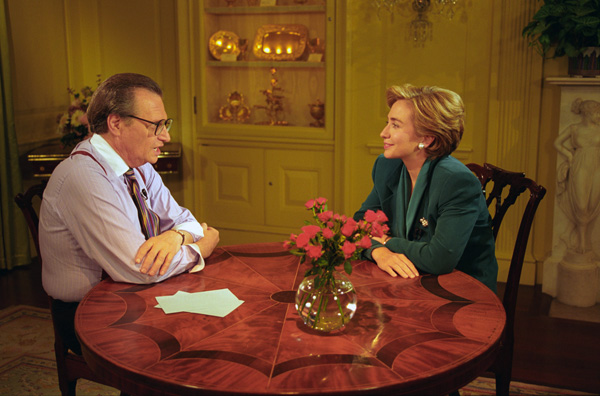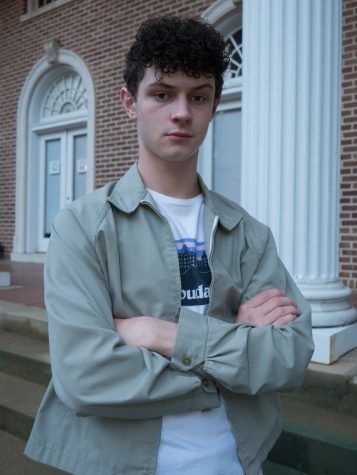Jenkins: Larry King’s legacy in journalism

National Archives and Records Administration, Public domain, via Wikimedia Commons
Larry King interviewed the likes of former First Lady Hillary Clinton during his career in journalism.
February 3, 2021
Larry King began his career as a humble columnist for the “Miami Herald,” but went on to become one of the most recognizable names in American journalism. His legacy and the impact he made on the journalistic world will live on for a long time to come.
Over the course of 32 years, starting in 1978, he recorded over 6,000 episodes of “Larry King Live,” garnering him a reputation as one of TV and radio’s most magnetic hosts.
“I remind myself every morning: Nothing I say this day will teach me anything. So if I’m going to learn, I must do it by listening,” the late broadcaster once said.
King interviewed the likes of world leaders, movie stars, musicians and everyone in between. He was known for his straightforward, yet genuine style of interviewing, which allowed his guests to show their true selves and say exactly what they meant.
Once his run with CNN ended in 2010, King embraced the world of online Journalism and continued to interview a variety of interesting guests on his YouTube channel. He also hosted a podcast with his (eighth) wife, “Back and Forth with Shawn and Larry King.”
King’s willingness to adapt to the changing shape of journalism over the years is something all journalists can learn from. Instead of lamenting the death of “traditional” styles of journalism, King found a way to use the changing landscape to his advantage to do what he loved in any way he could.
However, King did express discontent with the increasing bias he observed in the major 24-hour news outlets. He always emphasized the importance of letting the story–or in his case, the guest–speak for themselves.
“I’m not a fan of the ideologically-based show—right or left—because I don’t learn anything,” said King in a 2009 interview with Time. “I never learned a thing when I was talking. So these shows in which the host is on 90% of the time, the guest 10%, I don’t get it.”
He also cautioned against the rise of “new media,” and the danger that comes with everyone having the ability to spread whatever misinformation they want on massive social platforms like Twitter.
“When everyone’s a newsman, you get a lot of false news, overreaction to stories, jumping on stories too quickly and no measuring,” King said.
His influence on the world at large was undeniable, but he remained humble. Coming from an impoverished upbringing, King was always grateful for the position he had secured in life.
“I never forgot being poor, and I never stopped thinking how fortunate I am,” King said.
King had a clear love for journalism, and his career was driven by an “endless search to learn more,” as he put it in an interview with Entertainment Tonight. This constant curiosity is what motivated him to keep at it for so many years. “If I had a wish, one wish, I’d live forever,” King said.
Though he may not be with us anymore, his impact lives on through the thousands of conversations he had with people from all walks of life. His personality shined through in his quiet ability to listen and make his guests feel heard.
“I’ve had a great ride,” King said. “I’ve got no complaints.”








